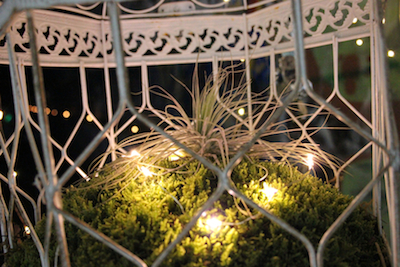By Amanda Painter
When someone asks, “Who are you? Tell me about yourself,” people often reply with their most public labels — things like job titles and occupation descriptions (including “parent”). You might flesh that out with the hobbies and non-career pursuits you’re most passionate about, or descriptors such as political affiliation, ethnicity and religion, or where you grew up. But, apropos of current astrology, how often do you answer with a straight-up description of your values?

Photo by Amanda Painter; from the 2016 Sacred and Profane festival on Peaks Island, Portland, Maine.
Granted, some of the categories listed above carry some level of implied shared values, because the labels describe a self-selecting community. But there are always exceptions, and it can be dicey to make assumptions.
Often the declaration of things like closely held moral, ethical and philosophical values come with a certain level of familiarity — which can include really connecting with someone you’ve just met. Or we demonstrate our values simply through the daily choices we make, though those actions are typically witnessed by very few others (what kind of food we buy; how we treat partners and family members; the level of attention we give our work on the job, and so on).
Occasionally — and perhaps more frequently — we make certain values known very publicly: by attending a rally; or giving an interview or writing an opinion piece for the local paper; or displaying a bumper sticker on our car.
Even so, it’s rare that someone will ask, “Who are you? Tell me about yourself,” and you’ll hear in response: “Oh, well, I’m someone who values my time more than that of others. But I’m also a person who highly values thoroughness, so anything I do I do completely and well, and I reward that in others. Oh, and since I value how people feel, I never ask ‘How are you’ unless I have time to truly hear their honest answer.”
That’s just not how we generally identify ourselves to others; at least not verbally, and not immediately. Yet in a sense, it is how we identify ourselves through our everyday actions, for anyone who cares to notice and connect the dots. And when we stop to notice this demonstration of values in ourselves, it can be very informative. Particularly if you discover that some of your professed values and ways of identifying yourself don’t fully match up with the small, everyday choices you make and behaviors you engage in.
For the last three and a half weeks or so, Venus has been moving retrograde through Aries. It’s entirely possible that in that time you’ve noticed something about how your values — both those you profess and those you demonstrate — contribute to your identity. Whether you’re aware of all of those facets, they are part of who you are. Ideally one would be aware of all of it. The truth is we all have our blind spots, and unconscious factors often call the shots.
When we notice these blind spots in our identity and values — no matter how jarring it is, or how ashamed we might feel to discover we’re not all that we like to think we are — we’re offered an amazing opportunity to bring things into better alignment. Sometimes that means modifying behavior. Other times, it means accepting more fully who we are and what we do, with compassion and love for ourselves and our imperfections. We’re here on Earth to learn, after all.
I mention all of this because between Friday and very late Saturday night, retrograde Venus will be on the Aries Point. This is the potent first degree of Aries, where the issues of the collective intersect with the personal. With Venus there, it becomes an intersection of values, and an opportunity to understand better how your values and your sense of identity fit into a bigger picture.
Where do your deepest values — both the ones you’re most passionate and vocal about, and the quieter ones that you rarely speak but continually act on — intersect with the world around you? Where do you see your various levels of self-identity reflected in the greater political movements, questions and struggles occurring now? In what ways does this feel polarizing or separative, and in what ways does it give you a feeling of interconnection and investment?
As Venus slides backward into Pisces (at 9:25 pm EDT Sunday / 00:25 UTC Monday), you may notice that any fiery quality to your discoveries and insights soften. Pisces is an emotional sign, but it also offers a deeper level of sensitivity and perhaps some buoyancy. We are all swimming in this sea of humanity together.
It’s also worth noting that before retrograde Venus makes its sign change this weekend, Mercury also changes signs. Mercury will move from Aries into Taurus at 1:30 pm EDT on Friday, March 31 (17:30 UTC).
Mercury is in direct motion, but is slowing down considerably for its own station retrograde on April 9. If you’re a U.S. resident and have not yet filed your income taxes and plan to by the April 18 deadline, you might want to get to it sooner rather than later. Either way, take your time with anything you do and double-check everything.
Thankfully having Mercury in Taurus favors tasks that are practical, material or financial in nature. Yet with Mercury in shadow, and with the ruler of Taurus — Venus — retrograde, the more methodical and the less rushed you can be, the better.
Use what you’ve learned from past experience — whether that means experience with retrograde planets; experience with filing your taxes (or other highly detailed financial tasks); or simply your experience of living in the body you have, with the values you have. You can’t learn everything you need to know from a book, or even from an astrology column. Somewhere along the line, you have to see who you are and how you live, and decide that you want to learn even more.



Eric mentioned on Planet Waves FM that Pallas Athene is on the Aries point during the Venusian conjunction as well. I heard on NPR today of the soaring suicide rate of women in the military; a epidemic. That only 6 of the 20 a day, who commit suicide actually gets helped; leaving 14 to fend for themselves. Also mentioned, was the necessity of respecting women; yet their devaluation is still or must be considered as acceptable behavior.
Yes, Glen — I could not quite fit Pallas in, along with their square to Quaoar in Capricorn. But it’s a worthwhile detail.
Do you mean that 6 out of 20 women who *attempt* suicide in the military get help after the attempt? Or are you referring to the lack of help available *before* these female soldiers kill themselves? Got a little confused by your phrasing. But I’m quite clear on the fact that PTSD — often caused by their fellow soldiers and commanding officers — is ravaging women in the US military just as much as its ravaging the men. But at least the men are less likely to be sexually assaulted by their supposed teammates. It’s all horrifying.
Pingback: Field Notes: End of March | The Preserved Life